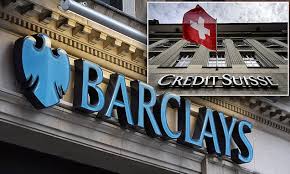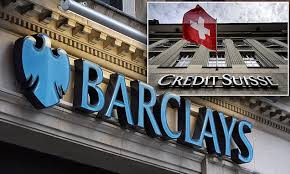
With Barclays admitting it broke the law and agreeing to pay $70 million, Barclays and Credit Suisse have settled federal and state charges that they misled investors in their dark pools, federal and New York state officials said on Sunday.
Marking the two largest fines ever paid in connection with cases involving dark pools the settlements between the banks and the U.S. Securities and Exchange Commission and the New York state attorney general stands out among such settlements.
A combined total of $154.3 million in fines and disgorgement is the amount that is to be paid.
The allegations against Barclays and Credit Suisse is that they misled investors in the dark pools, saying they would be protected from predatory high-frequency trading tactics.
While admitting that it violated securities laws and agree to install an independent monitor to ensure that its dark pool "Barclays LX" operates properly in the future, Barclays will pay a $70 million fine split evenly between the SEC and New York state.
In addition to $24.3 million in disgorgement to the SEC for executing 117 million illegal sub-penny orders out of its dark pool known as "Crossfinder", Credit Suisse will pay a $60 million fine split between the regulators.
Orders, in dark pools, are not visible to other traders until they are executed and this differentiates them from trading venues on public exchanges.
Institutional investors are helped in trading large blocks of shares without the market moving against them by the lack of pre-trade price information.
Credit Suisse will neither admit nor deny the allegations as part of the settlement.
The bank was pleased to have resolved the matters with the SEC and the New York attorney general said a Credit Suisse spokeswoman.
Since the settlement would enable the company to focus its efforts on serving clients, the bank was pleased, said a Barclays representative.
The settlement followed a dramatic high-stakes public legal battle between the bank and New York State Attorney General Eric Schneiderman.
Alleging fraud in its dark pool, a lawsuit was filed against Barclays in June 2014 by Schneiderman's office.
A "liquidity profiling" service that was meant to let traditional investors opt out of trading with high-speed traders was professed by the bank, alleged the lawsuit.
The program was riddled with "exceptions" that favored high-speed traders, said Schneiderman's office. Trading analysis that intentionally deleted its largest and most aggressive trader were also disseminated by the bank, alleged Schneiderman's office.
Furor over Michael Lewis' book "Flash Boys," which charged the stock market was rigged in favor of high-frequency traders preceded the lawsuit.
Barclays lost a bid to have the case dismissed last year.
"These cases mark the first major victory in the fight against fraud in dark pool trading that began when we first sued Barclays. We will continue to take the fight to those who aim to rig the system and those who look the other way," Schneiderman said in an emailed statement to the media.
"These cases are the most recent in a series of strong SEC enforcement actions involving dark pools and other alternative trading systems,” SEC Chair Mary Jo White said in a statement.
No individual in the banks were however charged by the regulators.
(Source:www.reuters.com)
Marking the two largest fines ever paid in connection with cases involving dark pools the settlements between the banks and the U.S. Securities and Exchange Commission and the New York state attorney general stands out among such settlements.
A combined total of $154.3 million in fines and disgorgement is the amount that is to be paid.
The allegations against Barclays and Credit Suisse is that they misled investors in the dark pools, saying they would be protected from predatory high-frequency trading tactics.
While admitting that it violated securities laws and agree to install an independent monitor to ensure that its dark pool "Barclays LX" operates properly in the future, Barclays will pay a $70 million fine split evenly between the SEC and New York state.
In addition to $24.3 million in disgorgement to the SEC for executing 117 million illegal sub-penny orders out of its dark pool known as "Crossfinder", Credit Suisse will pay a $60 million fine split between the regulators.
Orders, in dark pools, are not visible to other traders until they are executed and this differentiates them from trading venues on public exchanges.
Institutional investors are helped in trading large blocks of shares without the market moving against them by the lack of pre-trade price information.
Credit Suisse will neither admit nor deny the allegations as part of the settlement.
The bank was pleased to have resolved the matters with the SEC and the New York attorney general said a Credit Suisse spokeswoman.
Since the settlement would enable the company to focus its efforts on serving clients, the bank was pleased, said a Barclays representative.
The settlement followed a dramatic high-stakes public legal battle between the bank and New York State Attorney General Eric Schneiderman.
Alleging fraud in its dark pool, a lawsuit was filed against Barclays in June 2014 by Schneiderman's office.
A "liquidity profiling" service that was meant to let traditional investors opt out of trading with high-speed traders was professed by the bank, alleged the lawsuit.
The program was riddled with "exceptions" that favored high-speed traders, said Schneiderman's office. Trading analysis that intentionally deleted its largest and most aggressive trader were also disseminated by the bank, alleged Schneiderman's office.
Furor over Michael Lewis' book "Flash Boys," which charged the stock market was rigged in favor of high-frequency traders preceded the lawsuit.
Barclays lost a bid to have the case dismissed last year.
"These cases mark the first major victory in the fight against fraud in dark pool trading that began when we first sued Barclays. We will continue to take the fight to those who aim to rig the system and those who look the other way," Schneiderman said in an emailed statement to the media.
"These cases are the most recent in a series of strong SEC enforcement actions involving dark pools and other alternative trading systems,” SEC Chair Mary Jo White said in a statement.
No individual in the banks were however charged by the regulators.
(Source:www.reuters.com)





